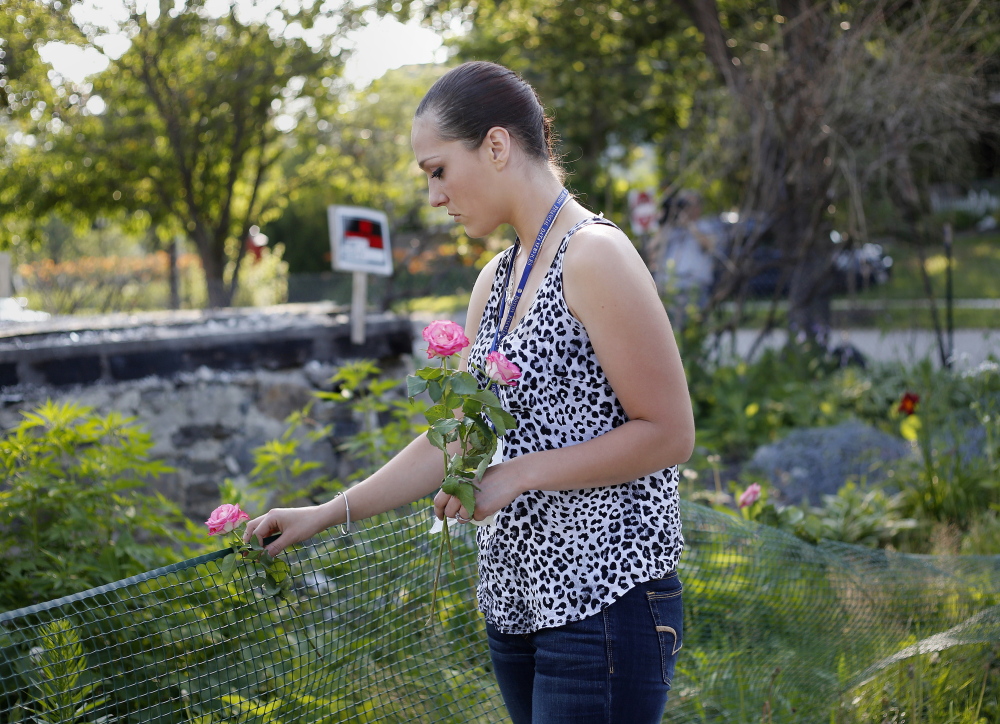Gregory Nisbet, the owner of the Noyes Street duplex where six people died in a Nov. 1, 2014, fire, was indicted on six counts of manslaughter by a Cumberland County grand jury Friday.
The grand jury also indicted Nisbet on three misdemeanor code violations for allegedly not having working smoke detectors, clear stairwells and a second means of escape from an upstairs bedroom.
Nisbet had been discussing a plea agreement with Cumberland County District Attorney Stephanie Anderson for weeks, but those negotiations fell apart this week.
Anderson said it is important to the state that Nisbet admit his responsibility in causing the deaths of the people, all in their 20s, who perished in the fire.
“I think it’s important to the victims’ families that the charges reflect what happened,” Anderson said Friday afternoon. Plea negotiations “did hang up on whether the defendant was willing to take responsibility for the charge of manslaughter.” Prosecutors representing the district attorney and the Attorney General’s Office had offered Nisbet the chance to plead guilty to fewer counts of manslaughter and would have recommended a lesser punishment than he might get if convicted in court.
Nisbet’s lawyer, Matthew Nichols, said his client wouldn’t plead to a manslaughter charge because he didn’t cause the deaths. He said Nisbet installed the required smoke detectors, but current and former tenants disabled them.
“He didn’t cause the fire and he didn’t cause the smoke detectors to be dismantled,” Nichols said shortly after the indictments were handed up. “There’s an argument that’s a code violation, but we don’t believe that kind of activity rises to the level of gross negligence or in any way caused the deaths.”
STATE WILL PUSH FOR JAIL TIME
A person is guilty of manslaughter if he recklessly or with criminal negligence causes the death of someone else. It is punishable by up to 30 years in prison and a $50,000 fine.
A conviction would not necessarily require Nisbet to go to prison, but the state will push for that.
“We’re a long ways from talking about the amount of jail time Mr. Nisbet would serve, but it would be the state’s position that Mr. Nisbet needs to do some jail time,” said Deputy Attorney General Lisa Marchese. “Six people’s lives were lost in this fire. It didn’t need to happen if the apartment building had been up to code.”
All that remains now of the building at 20-24 Noyes St. is a brick fireplace and the house foundation, surrounded by a chain-link fence. On Friday, a withered bouquet of flowers dangled from the fence. Yellow, purple, and white flowers are growing just inside it.
A handwritten sticker on a No Trespassing sign says “never forget Noyes St. RIP.” Across the street, a row of flags with hearts strung between a tree and a stop sign remain, but the names of the victims have faded.
The fire killed Steven Summers, 29, of Rockland, Maelisha Jackson, 23, of Topsham, and Chris Conlee, 25, of Portland, who were visiting the house, and David Bragdon Jr., 27, Ashley Thomas, 29, and Nicole Finlay, 26, who lived there.
‘THE WOUND IN MY HEART’
Ashley Summers, Steven Summers’ wife, arrived at the site of the fire Friday afternoon clutching six roses – one for each victim. She placed them one by one in the chain link fence as she wiped away her tears.
“Nothing can close the wound in my heart,” she said of losing her husband, who leapt from the burning building but died days later at a Boston hospital.
Summers was hoping that Nisbet would have accepted a plea deal to spare the families the grief of enduring a trial. However, she is confident the court case will shed light on how the code violations contributed to the deaths.
Summers said her two young daughters are doing better. She tells them their father is in heaven looking down on them. His memory is kept alive through photos and videos he left behind.
Nisbet also faces lawsuits from the families of those killed, though he reportedly has few assets. Thomas Hallett represents Ashley Summers.
“This particular case cried out for some accountability for Mr. Nisbet through the criminal justice system,” Hallett said. “You have a guy who really was operating an inherently dangerous apartment building for many years and turned a blind eye every chance he got.”
A real estate broker and landlord of 20-24 Noyes St. and at least two other properties in Portland, Nisbet has been accused in lawsuits filed by victims’ families of offering individual rooms for rent at that building without making the life-safety upgrades that are required to protect tenants in a rooming house.
The city only does routine inspections of buildings with three or more units, but city staff had received complaints about the Noyes Street property and followed up in the months before the fire. The fire led to a review of city oversight and the creation of a new fire safety office at City Hall.
DEFICIENT WARNING SYSYTEM
The cause of the fire was found to be accidental – a discarded cigarette ignited flames on the front porch. However, fire investigators concluded that the house did not have functioning smoke detectors, let alone the more sophisticated fire alarm system that would be required of a rooming house.
David Scott, the brother of fire victim Chris Conlee, said he and his family hold no personal ill-will against Nisbet, but they want the court to determine his culpability, and to hold him accountable.
“We’re looking at this as an experience that could prevent any future occurrences from happening,” Scott said. “What we’re looking for is something positive to come out of this.” Scott called the city’s plans to improve its inspection program a “step in the right direction.”
Nisbet had a reputation among some former tenants of being a relatively lax landlord willing to work with people who fell behind on rent. He also frequently declined to use leases, a practice called tenancy at-will, a somewhat controversial but not unheard-of practice among property owners that gives landlords and tenants flexibility, but can sometimes lead to disagreements about rental terms.
Colleagues in the real estate business said he is an outgoing landlord who sought to see the big picture, not nickel-and-dime his tenants.
The residents who died were in that building because of their socio-economic status and Portland’s tight housing market, Anderson said.
“These were basically the working poor,” Anderson said. “They were all in their 20s, a couple of them were working two jobs. They were paying $350 a month in rent. Unless you’re on Section 8 housing, you can’t find a room for $350 a month.”
According to the indictment documents, the code violations of the National Fire Protection Association standards are for failure to provide a second means of escape from a bedroom, failure to encase inside stairwells with a fire barrier and keep them clear of debris, failure to provide a fire alarm system in a rooming house or lodging, and failure to provide smoke alarms.
Evidence that might have shifted some culpability onto the tenants – disabled smoke detectors and a blocked stairwell – were presented to the grand jury, but the panel still believed Nisbet was criminally responsible, Anderson said.
The grand jury indictments are not a conviction, but are a glimpse into how the community views the behavior, she said. Anderson says she is confident if the case does go to trial, Nisbet will be convicted.
PLEA DISCUSSIONS MIGHT CONTINUE
Nichols, Nisbet’s lawyer, said the grand jury’s conclusion isn’t necessarily indicative of a trial verdict. The grand jury only hears from the prosecution. The defense does not get to challenge the state’s evidence or present any of its own, and the standard of proof is much lower.
Nichols would not comment on whether Nisbet feels responsible for the deaths.
“Since this incident occurred, Greg has been overwhelmingly distraught and sorrowful over the deaths of his tenants,” Nichols said. The fire has ruined Nisbet financially and destroyed his business, but that is secondary to his sorrow, the attorney said.
“That does not mean he’s responsible for it or caused it,” Nichols said.
Discussions on a possible plea agreement could continue right up to and during the trial, he said. Anderson said it is her policy not to offer the same terms post-indictment as were presented before going to the grand jury.
Fire officials said the fire started on the porch and quickly engulfed the front door. A rear staircase was blocked, forcing the three survivors to jump from second-story windows.
The fire focused attention on inspection requirements for apartments in Portland and ultimately led to calls for increased inspections. City firefighters had only been conducting proactive inspections of apartment buildings containing three or more units. However, nearly half of the city’s rental units are two-family homes like the one at 20-24 Noyes St.
City officials convened a housing safety task force, which recommended that the city create an office specifically to oversee rental units.
Portland city councilors voted Monday night to create a housing safety office that will be responsible for inspecting thousands of rental housing units in the city.
Nisbet has been a licensed real estate broker since 1988, when he began working at his family’s real estate business, Downeast Realty in South Portland, where he specialized in the sale of multifamily homes. He lives on Noyes Street in Portland,
Brit Vitalius, a Portland real estate broker who’s known Nisbet since 2004, was surprised and concerned by the charges. If Nisbet is convicted, Vitalius is worried about what precedent the case would set on the responsibility of landlords.
Prosecutors did not seek to have Nisbet arrested but instead he will be issued a summons to appear in court at a future date for arraignment, Anderson said. She does not believe he is a flight risk.
David Hench can be contacted at 791-6327 or at:
Twitter: Mainehenchman
Correction: This story was updated at 1:35 p.m. Saturday July 11, 2015 to correct Maelisha Jackson’s age. She was 23.
Send questions/comments to the editors.





